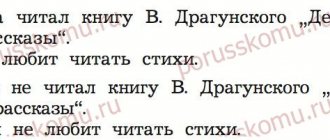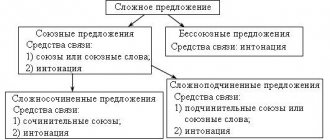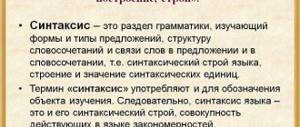Basic Rules
To get started with the spelling rule, you need to remind yourself of the important aspects and definitions of the words involved in spelling “not” with verbs.
A verb is an independent part of speech that means an action or state of an object. Most often he answers the questions: “What should I do?” (imperfect view), “What to do?” (perfect view). In most cases, this part of speech acts as a predicate in a sentence, but in the Russian language there are constructions in which verbal forms are used as a subject, attribute, circumstance or object. Because of their complex and varied construction, verbs have a wide range of rules and exceptions that you need to know and use correctly.
In accordance with the spelling rule, verb forms with “not” are written separately . To see this, you can look at several examples:
- I can't write;
- I don't want to read;
- don't forget your notepad;
- did not write an essay;
- not notice the stain;
- didn't show up for the meeting;
- I won't water the flowers.
Now let's take a deeper look at the rules for writing "not" with verbs. It has 3 points:
- The negation “not” with verbs (personal form, infinitive, gerund form) is written separately. Examples: don't be sad, don't sleep, don't think, don't read.
- When denoting a physical action, the negative form with the particle “not” is written separately: do not reach the closet with your hand.
- With semantic importance expressing a lack of something, the particle “not” will be an irreplaceable part: the skill is lacking.
There are verbs that are not used without “not”, as a result of which they are written together with this particle. For example: resent your sister, hate pea soup, feel unwell after an illness, be perplexed after reading a problem, dislike your stepmother, feel unwell after frostbite.
A verb similar to the word grab, in any meaning, is written separately with the particle not. Examples:
- The child has grown up and is now missing various objects from the dirty floor.
- The magazine is missing the tenth chapter.
It is also necessary to distinguish the separate spelling of the phrase “not to reach” (in the sense of “not to reach”) from a similar merged one - “to lack”, which means “to be in insufficient quantities” . Example sentences:
- He can't reach the ceiling with his hand.
- Five thousand is missing from my wallet. Lacks fortitude (meaning “absence”). The boy lacked patience.
The particle “not” in compound prepositions despite and despite and in conjunctions “despite the fact that”, “despite the fact that” will always be written together with the rest of the word, that is, it is part of it.
But it is still necessary to distinguish between the gerund and the particle “not”, which is written separately. Example sentence: He told the rule at the blackboard without looking at the book.
Verbs with the compound prefix under- should be written together. This prefix gives the word incompleteness of action (the meaning of this part of the word is often opposite to the prefix over-: underfill - overflow, undertake - overtake). For example: not enough books, not enough soup, not enough screws, not enough candies, not enough bricks.
It is necessary to distinguish between verbs with the prefix under-, which mean an action performed less than the norm, and consonant words with the prefix do-, which are preceded by the negation “not”, indicating, when written together with a particle, that the action was not completed.
Examples: failing to look after the baby - not watching the performance until intermission; the unemployed were undernourished most of the time - the children constantly did not finish their salad at dinner, waiting for candy; the poor were constantly underpaid—these people never paid extra.
Also suitable here is writing based on a general rule, that is, separately: do not catch up with the opponent to the finish line, do not finish the essay to the end, do not finish reading the book, do not complete the exercise, did not agree on anything.
Exception words
Surprisingly, in the Russian language there are cases of spelling “ne” with the verb together. These words are exceptions to the rule; they need to be learned by heart in order to always correctly express your thoughts on paper and not be confused with words that are written according to the general rule. This occurs in the spelling of those words whose morphemic composition is not a prefix or part of the root, that is, without it, these words do not exist as independent lexical units. Without the initial non- they are not used in speech.
The particle is not written together with verbs that have the prefix under-. These words denote a completed action, but not corresponding to a certain level. Examples:
- to hear poorly - to hear poorly;
- they were malnourished (starved) together;
- we did not like this lesson (there is no word “more to love”);
- lack of sleep (sleeping less than expected).
As part of such words, it is impossible to replace it with the prefix per- with an antonymous (opposite) meaning . If such a replacement is possible, then the word will be written together:
- underestimate your strength - overestimate your strength;
- undercook the pies - overcook the pies;
- underfulfill the plan - overfulfill the plan;
- underfill water - overfill water;
- undercook the potatoes - overcook the potatoes;
- underwrite an essay - rewrite an essay.
It is necessary to distinguish between the spelling of the words “to lack” in the meaning of “not enough” and “not to reach” - “not to reach, not to achieve something.” Examples:
- He lacked luck in life.
- The fisherman does not reach the river bottom with his oar.
There is also a list of verbs that are not used without non- under any circumstances. Examples of similar words:
- underfulfill;
- to be unwell;
- dislike;
- underestimate;
- mishear;
- misunderstand;
- to receive less;
- undercount, etc.
Spelling "not" with verbs
“Not” with verbs is written separately
If in a sentence there are two words of different parts of speech, “not” and a verb, then in their writing we apply the rules of spelling of the Russian language.
Rule
“Not” with verbs and verb forms is written separately.
To understand when “not” is written separately from the words of this part of speech, let’s compare two sentences.
The sun rose over the forest.
The sun has not yet risen over the forest.
In the first sentence, the verb “rose” is used to explain the noun “sun”. The entire sentence has an affirmative meaning. In the second sentence, the same verb has the particle “not”, which gives the sentence a negative meaning:
the sun didn't rise.
The particle “not” is a completely independent word of the auxiliary part of speech, which is written separately with verbs in different grammatical forms:
- haven't read the book;
- I don’t look out the window;
- the phone doesn't ring;
- I wouldn't like to be late;
- do not be silent
- do not Cry.
But not with all verbs “not” is written separately. Let's consider in what cases “not” should be written together.
“Not” is written together with verbs
In the Russian language there are a number of words of this independent part of speech, with which the initial element is not written together. In these cases, it is not a prefix or part of a root, without which the word simply does not exist as an independent lexical unit.
Examples of verbs
- be indignant
- be perplexed
- feel unwell
- to force
- itching
- hate
- dislike
- go on a rampage
- bad luck
- not to see the light.
Additional material
See more examples of verbs that are written together with “not”.
Example sentences
As an avid fisherman, he has been itching to go to the lake since early morning.
It seems that she disliked me from the first minute of meeting.
Do you want to force your son to learn this craft, which he has no soul for?
Well, now we’re all clearly in trouble!
Grandpa is not feeling well today.
Useful tips
For better memorization, you should use the table. It will allow you to correctly apply the rule when writing texts.
| Rules for writing a verb with “not” together | Example |
| It is not used without "not". To define, you need to discard the prefix. If this cannot be done, then “not” is written together | Hate (there is no word “hate”); bad luck |
| With “under” in the context of “insufficient quantity” | Maria lacks knowledge to complete the task |
| With “under” in the context of incomplete action | Pasha didn't add enough water |
In order not to confuse the incompleteness of an action with an action in words with the prefix do- and the particle not, you must try to substitute a verb with the opposite meaning and the prefix re-. If you can do this, it means there is no need to write together.
One of the important aspects is also the need to distinguish verbs with prefixes and particles from words where “under” is part of the root. An example is “to be perplexed.” Here the particle “not” is always written together with the verb. This is an exception to all verb rules, so the spelling consistent with the word must be learned and never forgotten:
- Even though the eye sees, the tooth hurts (proverb).
- She does not hide her feelings, neither when she loves nor when she hates.
- After scoring a goal against the enemy, joyful fans went wild in the stands.
- Grandmother said that she had been unwell since the evening.
- If she dislikes someone, then it’s forever.
As the rule says, “not” with verbs is written separately in 90% of cases. To write correctly, you need not only to cram spellings, but also to constantly expand your vocabulary, without being afraid to use it in everyday life.
Spelling “not” with verbs: rules and exceptions
The basic rule sounds very simple: “not” with verbs is written separately . Even the youngest students remember it, having learned it from the first grade. And in general, this is true: I don’t jump, I don’t play, I don’t do anything. These are simple examples not with verbs written separately. In any of its forms - personal, infinitive or as a gerund - this part of speech is written with “not” separately. At first glance, remembering this is enough and you can move on to more complex cases of spelling not with other parts of speech, of which there are plenty in the Russian language.
But, oddly enough, there are cases of this negative particle being written together with a verb. They are exceptions to the general rule, which must be treated very carefully, remembered and used wisely, without getting confused by them.
The table in which they are discussed will help you better understand the exceptions:
| Continuous writing rule | Example |
| A verb without “not” is not used, it’s easy to determine - you need to remove the prefix | To be indignant (there is no verb “to be indignant”), to hate (as there is no verb “to hate”) |
| Verb with “under” meaning insufficient quantity | He lacks patience. That's all she needed |
| Verb with “under” meaning incompleteness of action | Mom didn't add enough salt to the soup. He clearly underestimated his capabilities. |
In order not to confuse the verb with the meaning of incomplete action with an ordinary verb with the prefix do and the particle not, you need to try to find an antonym for it with the prefix re-. If everything worked out, then the verb with “nedo” should be written together. For example: under-salted - over-salted.
By the way, it is also important to distinguish words with prefixes and particles from those where “under” is part of the root. An example of such a word is “perplexed.” In this case, it is not always written together with the verb. In any case, “under” is an exception from all verb vocabulary, which is why the rules associated with it are so important to remember.
“Not” with verbs is written separately because in very rare cases it acts as a prefix or part of a root; in most cases it is really a negative particle - hence the rule about separate spelling, because it is the prefix in its own role or one that is written together that is written together. as a result of historical processes, it has become fused with the root, which can no longer be used without it.





